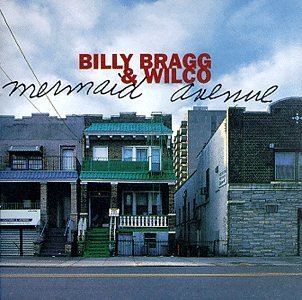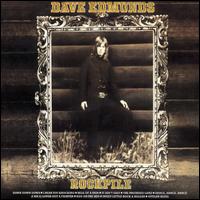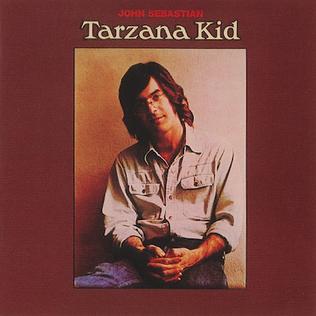
On the Beach is the fifth studio album by Canadian-American musician Neil Young, released by Reprise Records in July 1974. It is the second of the so-called "Ditch Trilogy" that Young recorded following the massive success of 1972's Harvest, and reveals the artist grappling with feelings of over-exposure, alienation and melancholy.

What Were Once Vices Are Now Habits is the fourth studio album by American rock band the Doobie Brothers. The album was released on February 1, 1974, by Warner Bros. Records.

Ramblin' Jack Elliott is an American folk singer, songwriter and story teller.

Mermaid Avenue is a 1998 album of previously unheard lyrics written by American folk singer Woody Guthrie, put to music written and performed by British singer Billy Bragg and the American band Wilco. The project was the first of several such projects organized by Guthrie's daughter, Nora Guthrie, original director of the Woody Guthrie Foundation and archives. Mermaid Avenue was released on the Elektra Records label on June 23, 1998. A second volume of recordings, Mermaid Avenue Vol. II, followed in 2000 and both were collected in a box set alongside volume three in 2012 as Mermaid Avenue: The Complete Sessions. The projects are named after the song "Mermaid's Avenue", written by Guthrie. This was also the name of the street in Coney Island, New York, on which Guthrie lived. According to American Songwriter Magazine, "The Mermaid Avenue project is essential for showing that Woody Guthrie could illuminate what was going on inside of him as well as he could detail the plight of his fellow man". It was voted number 939 in Colin Larkin's All Time Top 1000 Albums 3rd Edition (2000).

Will the Circle Be Unbroken is the seventh studio album by American country music group The Nitty Gritty Dirt Band, released in November 1972, through United Artists Records. The album was a collaboration with many famous bluegrass and country-and-western players, including Roy Acuff, "Mother" Maybelle Carter, Doc Watson, Earl Scruggs, Randy Scruggs, Merle Travis, Pete "Oswald" Kirby, Norman Blake, Jimmy Martin, and others. It also introduced fiddler Vassar Clements to a wider audience.

Roses in the Snow is the seventh studio album by country music artist Emmylou Harris, released in 1980. While Harris' previous release, 1979's Blue Kentucky Girl, featured traditional, straight-ahead country, Roses in the Snow found Harris performing bluegrass-inspired music, with material by Flatt and Scruggs, Paul Simon, The Carter Family, and Johnny Cash. Cash, Dolly Parton, Linda Ronstadt, The Whites, Ricky Skaggs, Willie Nelson and Tony Rice made guest appearances. "Wayfaring Stranger" was released as the first single in 1980 and went to #7 on the Billboard Country charts. The second single, a remake of a Simon & Garfunkel song, "The Boxer", reached #13. Backing musicians included Albert Lee and Jerry Douglas.

Alice's Restaurant is the debut studio album by Arlo Guthrie released in October 1967 by Reprise Records. It features one of his most famous songs, "Alice's Restaurant Massacree". A steady seller, the album peaked at No. 17 on the Billboard Top LPs chart in March 1968. The album re-entered the chart in October 1969 and reached No. 63 in November of that year. Alice's Restaurant went gold in September 1969 and Platinum in October 1986.

Other Voices, Other Rooms is the tenth studio album by American singer Nanci Griffith. It was released on March 2, 1993, by Elektra Records. Her first since leaving MCA Records, it consisted entirely of cover songs, in tribute to songwriters who influenced her own songwriting. Guest artists who appear in their own compositions included Frank Christian playing guitar on "Three Flights Up", Bob Dylan playing harmonica on "Boots of Spanish Leather", and John Prine lending harmony vocals on "Speed of the Sound of Loneliness". The album was titled after the Truman Capote novel of the same name.

Running Down the Road is the second studio album by American folk singer Arlo Guthrie. Guthrie's version of the traditional folk tune "Stealin'" was featured in the film Two-Lane Blacktop. The cover shows the artist upon a Triumph TR6 Trophy motorcycle which is also pictured in the album's 'gate'. Clarence White and Gene Parsons from the then current lineup of The Byrds played on some tracks.

Hobo's Lullaby is an album by the American folk singer Arlo Guthrie. It was released in 1972 on Reprise Records. It was re-released on Rising Son Records in 1997. The album contains Guthrie's only Top 40 hit, a cover of Steve Goodman's "City of New Orleans".

Rockpile is the first solo album by Dave Edmunds, released in 1972. It is principally focused on remakes of late 1950s and early 1960s hits, with a few new songs included. Edmunds plays almost all the instruments except for bass and backing vocals, which are played by John Williams, Edmunds' former bandmate in Love Sculpture. The album included a 1970 British #1 and worldwide Top 10 single, "I Hear You Knocking". A 2001 reissue of the album includes both sides of Edmunds' three pre-album singles as bonus tracks.

The Best of Arlo Guthrie is a 1977 compilation album by Arlo Guthrie.

Last of the Brooklyn Cowboys is a 1973 album by the American singer-songwriter Arlo Guthrie. The title was borrowed from a nickname given to Ramblin' Jack Elliott. Although not intended as a concept album, Guthrie recorded it with the goal of evoking a particular, "mythical" place and era, which he also intended to embody in the cover art.

Arlo Guthrie is the epynomous sixth studio album by the folk singer Arlo Guthrie.

Don't It Drag On is an album by American singer/songwriter Chris Smither, released in 1972. It was re-released on CD along with I'm a Stranger Too! in 2002.

Amigo is a 1976 album by Arlo Guthrie. It is his seventh studio album. The album peaked at No. 133 on the Billboard 200.

Will the Circle Be Unbroken, Volume III is the 2002 album from The Nitty Gritty Dirt Band. This album reached 18 on the US Country chart. Earlier albums in the series include Will the Circle Be Unbroken and Will the Circle Be Unbroken: Volume II.

Outlasting the Blues is the tenth studio album by American singer-songwriter Arlo Guthrie, released in June 1979 by Warner Bros. Records. Produced by John Pilla and recorded from January to March 1979 with Guthrie's touring band Shenandoah, the album consists of songs about mortality, spirituality, love, and the passing of time.

Mungo Jerry is the debut album by Mungo Jerry, released in 1970. The initial British release featured lettering on the front of the sleeve and a group photo inside which appeared to be three-dimensional when viewed through a pair of 3D red and green lenses included in the packaging. It reached No. 14 in the British charts that summer. Some foreign versions include the track "In the Summertime".

Tarzana Kid is an album by American singer-songwriter John Sebastian, released in 1974. The album was a commercial failure and did not chart. His next album which featured "Welcome Back" was his last for the Reprise label.




















